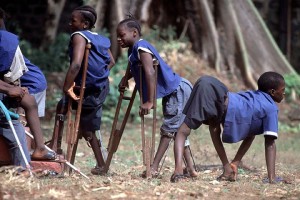Rotary International has announced plans to contribute $75 million over three years to the Global Polio Eradication Initiative as part of a worldwide effort to close a $945 million funding gap that threatens to derail the 24-year-old global health effort, even as new polio cases are at an all-time low.

Rotary, which already has contributed more than $1.2 billion to stop this crippling childhood disease, announce its new funding commitment in New York City on Thursday, September 27, 2012 during a special side-event on polio eradication convened by United Nations Secretary-General Ban Ki-moon during the 67th Session of the UN General Assembly.
Secretary-General Ban, who has made polio eradication a top priority of his second term, issued a strong call, urging UN member states to ramp up their support for the polio eradication initiative, launched in 1988 by Rotary, the World Health Organisation, UNICEF, and the U.S. Centers for Disease Control and Prevention. The partnership now includes the Bill & Melinda Gates Foundation and the United Nations Foundation.
The New York event included two panel sessions with remarks by Wilf Wilkinson, chair of The Rotary Foundation; Bill Gates, co-chair of the Gates Foundation; and top leaders and heads of state from the remaining polio-endemic countries and key donor countries. The wild poliovirus is now endemic only to Afghanistan, Pakistan, and Nigeria, although other countries remain at risk for re-established cases imported from the endemics.
“It is imperative that governments step up and honor their commitments to polio eradication if we are to achieve our goal of a polio-free world,” said Wilkinson. “We are at a true tipping point, with success never closer than it is right now. We must seize the advantage by acting immediately, or risk breaking our pledge to the world’s children.”
The urgency at the UN follows action taken in May by the World Health Assembly, which declared polio eradication to be a “programmatic emergency for global public health.” Although new polio cases are at an all-time low – fewer than 140 worldwide so far this year – the $945 million shortfall has already affected several scheduled immunisation activities in polio-affected countries and could derail the entire program unless the gap is bridged. If eradication fails and polio rebounds, up to 200,000 children a year could be paralysed.
Polio cases have plummeted by more than 99 percent since 1988, when the disease infected about 350,000 children a year. Fewer than 700 new cases were reported in 2011. Rotary and its partners have reached more than 2.5 billion children with the oral polio vaccine, preventing more than five million cases of paralysis and hundreds of thousands of pediatric deaths.
Rotary’s chief responsibilities in the initiative are fundraising and advocacy, a role of increasing importance as the end game draws near. In early September, Rotary launched a new, interactive website http://www.endpolionow.org intended to educate, activate and inspire visitors to actively support the polio eradication effort. Visitors are encouraged to sign a petition calling for world leaders to commit additional resources to close the funding gap. The e-signatures will be presented to Secretary-General Ban in New York. Site visitors can also estimate the potential dollar value they can generate by sharing the polio eradication message through social media platforms, such as Facebook and Twitter.
Earlier this year, Rotary raised $228 million in new money for polio eradication in response to a $355 million challenge grant from the Gates Foundation, which promptly contributed an additional $50 million in recognition of Rotary’s commitment.
